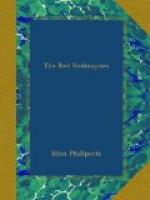They had started in the grey dawn, passed up a dry watercourse, and proceeded where the vine was queen and there fell a scented filigree of dead blossom from flowering olives. They had seen a million clusters of tiny grapes already rounding and had passed through wedges and squares of cultivated earth, where sprang alternate patches of corn yellowing to harvest and the lush green of growing maize. Figs and almonds and rows of red and white mulberries, with naked branches stripped of foliage, broke the lines of the crops. Here hedges sparkled in a harvest of scarlet cherries; and here sheep and goats nibbled over little, bright tracts of sweet grass. Higher yet shone out groves of chestnut trees, all shining with the light of their tassels, very bright by contrast with the gloom of the mountain pines.
And then, where two tall cypresses stood upon either side, Jenny and Assunta found the shrine and stayed a while. Jenny set down the basket which she carried with their midday meal, and her companion dropped the great bin destined to hold mulberry leaves.
The lake below was now reduced to a cup of liquid jade over which shot streamers of light into the mountain shadows at its brink; but there were vessels floating on the waters that held the watchers’ eyes.
They looked like twin, toy torpedo boats—mere streaks of red and black upon the water, with Italy’s flag at the taffrail. But the little ships were no toys and Assunta hated them, for the strange craft told of the ceaseless battle waged by authority against the mountain smugglers and reminded the widow of her own lawless husband’s death ten years before. Caesar Marzelli had taken his cup to the well once too often and had lost his life in a pitched battle with the officers of the customs.
Long shafts of glory shot between the mountains and drenched the lake; the shoulders of the lesser hills flamed; the waters beneath them flashed; and far away, among the table-lands of the morning mist, against a sapphire sky, there gleamed the last patches of snow.
A cross of rusty iron surmounted the little sanctuary by which they sat, and the roof was of old tiles scorched a mellow tint of brown. To Maris Stella was the shrine dedicated; and within, under the altar, white bones gleamed—skulls and thighs and ribs of men and women who had perished of the plague in far-off time.
“Morti della peste,” read Jenny, on the front of the altar, and Assunta, in gloomy mood before the recollection of the past, spoke to her young mistress and shook her head.
“I envy them sometimes, signora. Their troubles are ended. Those heads, that have ached and wept so often, will never ache and weep again.”
She spoke in Italian and Jenny but partially understood. Yet she joined Assunta on her knees and together they made their morning prayer to Mary, Star of the Sea, and asked for what their souls most desired.




